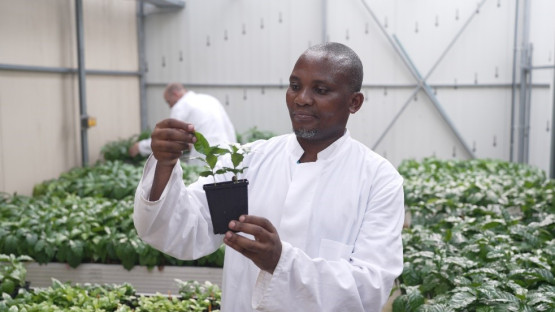More than 700 million people faced hunger in 2022, according to the United Nations. On 1 December at a joint IAEA-FAO high-level event on the occasion of the 28th Session of the Conference of the Parties (COP28), IAEA Director General Rafael Mariano Grossi, together with FAO Director General Qu Dongyu, presented the newly launched #Atoms4Food initiative, intended to alleviate the urgent pressure of climate change on food security by bolstering agricultural production and improving soil and water management through nuclear science.
Side event attendees at COP28 heard how this new initiative builds upon the nearly 60 years of IAEA-FAO collaboration through the Joint FAO/IAEA Centre of Nuclear Techniques in Food and Agriculture. It combines the organizations’ unique strengths to the benefit of populations facing hunger. The IAEA, through the Joint Centre, uses nuclear applications to support countries to identify and solve challenges caused by climate change. FAO Director General Qu stressed the importance of nuclear science and technology for evidence-based decision making.
“Food is a basic human right for everyone. We have to produce more with less because of the climate crisis. We need science-based solutions and a technically driven approach to contribute in the future,” said Mr Qu at the side event.
IAEA Director General Grossi elaborated on the IAEA’s approach to supporting Member States and the tangible nature of IAEA-FAO support envisioned under the #Atoms4Food initiative.
“We are going to start with the self-assessments made by countries, because we believe that we need to follow their approaches and what is concerning for them. Then we will roll out tailormade projects and programmes for them,” said Mr Grossi. “We are moving in a concrete way – not too much talk, but action. We will bring to the countries the solutions they need,” he added.
From food irradiation and climate smart agriculture to plant breeding and insect pest control, side event participants heard first-hand how the effects of climate change are being successfully addressed with nuclear applications. Representatives of China, Mexico, Turkey, the United States of America and Viet Nam provided specific examples of support from both UN organizations.
“The Joint FAO/IAEA Centre has made positive and concrete gains – as is highlighted with drought resistant crops and improved water use efficiency,” said Cary Fowler, United States Special Envoy for Food Security. He went on to underscore the support of the United States for #Atoms4Food: “We welcome this new initiative – it truly builds on the organizations’ strengths – the science of the IAEA and the FAO’s presence on the ground.”
The #Atoms4Food initiative was launched in October 2023 at the World Food Forum in Rome. It is comprehensive in scope and covers crop improvement, animal production and health, soil and water management and crop nutrition, insect pest control, food safety, and public health and nutrition.




